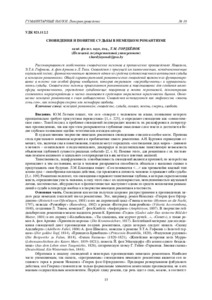Please use this identifier to cite or link to this item:
https://elib.psu.by/handle/123456789/18459Full metadata record
| DC Field | Value | Language |
|---|---|---|
| dc.contributor.author | Гордеёнок, Т. М. | - |
| dc.date.accessioned | 2017-01-10T06:31:19Z | - |
| dc.date.available | 2017-01-10T06:31:19Z | - |
| dc.date.issued | 2016 | - |
| dc.identifier.citation | Вестник Полоцкого государственного университета. Серия A, Гуманитарные науки. - 2016. - № 10. – C. 15-21. | ru_RU |
| dc.identifier.issn | 2070-1608 | - |
| dc.identifier.uri | https://elib.psu.by/handle/123456789/18459 | - |
| dc.description | Dreaming and the Notion of Fate in German Romaticism T. Hardziayonak | ru_RU |
| dc.description.abstract | Рассматриваются особенности сновидческих текстов в прозаических произведениях Новалиса, Э.Т.А. Гофмана, А. фон Арнима и Л. Тика. Сновидения с присущей им хаотичностью, неподчиненностью каузальной логике, фантастичностью являются одним из средств художественного воплощения судьбы в немецком романтизме. Общей характеристикой романтических сновидений является их функционирование в тексте как особой формы инобытия, которая отражает «сверхобычность» и иррациональность судьбы. Сновидческие тексты привлекаются романтиками в повествование для создания атмосферы напряженности, упреждения судьбоносных поворотов в жизни персонажей, демонстрации сложности мироустройства и часто становятся средством отражения трагичности бытия. Отношение немецких романтиков к снам амбивалентно. Сновидения используются как мифологема «жизнь есть сон», как метафора смерти или метафора свободы.=Peculiarities of reverie texts in Novalis’s, E.T.A. Hoffman’s, A. von Arnim’s and L. Tieck’s prose are considered. Dreams with their disorder, insubmission to causal logic, fabulousness are one of the means of artistic embodiment of fate in German Romanticism. General characteristic of Romantic dreams is their text-function as a special form of otherness which portrays hyper-conventionality and irrationality of fate. Reverie texts are incorporated by the Romanticists for creating the atmosphere of tension, anticipation of crucial turns in their protagonists’ lives, demonstration of the complexity of universe. They often become means of depiction of tragic existence. German Romanticists’ attitude to dreams is ambivalent. Dreams are used as a ‘life is a dream’ mythologem, as a metaphor for death or freedom. | ru_RU |
| dc.language.iso | ru | ru_RU |
| dc.publisher | Полоцкий государственный университет | ru_RU |
| dc.relation.ispartof | Веснік Полацкага дзяржаўнага ўніверсітэта. Серыя А, Гуманітарныя навук | be_BE |
| dc.relation.ispartof | Herald of Polotsk State University Series A, Humanity sciences | en_EN |
| dc.relation.ispartof | Вестник Полоцкого государственного университета. Серия A, Гуманитарные науки | ru_RU |
| dc.relation.ispartofseries | Серия A, Гуманитарные науки;2016. - № 10 | - |
| dc.rights | open access | ru_RU |
| dc.subject | Государственный рубрикатор НТИ - ВИНИТИ::ОБЩЕСТВЕННЫЕ НАУКИ::Литература. Литературоведение. Устное народное творчество | ru_RU |
| dc.subject | немецкий романтизм | ru_RU |
| dc.subject | судьба | ru_RU |
| dc.subject | символ | ru_RU |
| dc.subject | German Romanticism | ru_RU |
| dc.subject | dreams | ru_RU |
| dc.title | Сновидения и понятие судьбы в немецком романтизме | ru_RU |
| dc.type | Article | ru_RU |
| dc.identifier.udc | 821.112.2 | - |
| Appears in Collections: | 2016, № 10 | |
Items in DSpace are protected by copyright, with all rights reserved, unless otherwise indicated.
